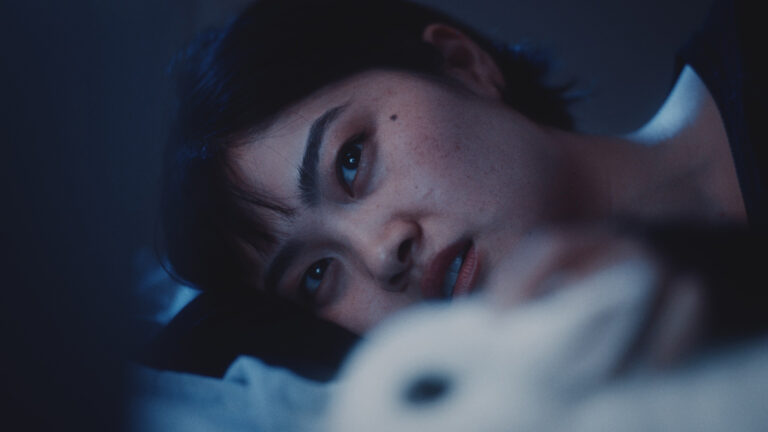A Portrayal of Toxic Social Circles
This introduction begins on a weird foot. The client mentioned that he had a “special” gift for her. It is a bunny, a small pet rabbit for her to care for. Rebecca does not know what to do with it but is grateful that her client is willing to spend plenty of money on her. As the narrative develops, this relationship later takes a turn, initially for the better and later for the worse. But this initial meetup, where the client has his camera covered, and only his voice is heard, hints at the main character’s loneliness, the division between privacy and openness, and the construction (and deconstruction) of online relationships. There’s a sadness to her words, something in her expressions, or more so, the facade in front of her true self that’s easily noticeable from the get-go.
There’s interest from the viewer in exploring the reason for her sadness and why she wears a mask in reality, and she shows her true persona in the chat room. In between this interest, there also lies a certain detachment, induced by the characters’ tone to the predicaments Rebecca goes through to the dialogue between them that, in essence, feels genuine while, in execution, rings quite the opposite, false and hackneyed. Zhu’s portrayal of toxic social circles, whether online or in-person, is frank in “Bunnylovr.” There is a sincerity in each narrative beat that feels tethered to her own experiences or ones that are felt universally by many people across the globe who use the internet and social media as outlets for connection. However, in the way that these experiences are written to the screen, a failure to connect appears, which detaches the viewer from this potentially relatable tale.
“Bunnylovr” follows Rebecca (Zhu)—referred to as Becca by her friend, Bella (Rachel Sennott), or Teddy in her chat room–as she navigates the socially cold and distancing world that is the social media generation, as well as the re-appearance of her estranged father, William (Perry Yung), who is dying from a cancerous illness. Her world shifts rapidly upon the “reconnection” with her father. She cares for William yet does not need to see him. Whenever he appears out of nowhere, it is for a favor or to help him cheat on his street games. But this isn’t the only link that develops during the narrative. There is also a top client of hers, John (Austin Amelio), who is paying top dollar for the private chats between him and Rebecca.
An Obnoxious Group of Friends
John only wants Teddy for himself. Seeing her brightens his day, but his demands on Teddy are staggering. Having someone spending tons of money on you does entice you a bit. Rebecca knows that this “game” is not for the long run. There is a stop point to all of this. Will her constant search for someone who matches her energy and understands her loneliness get in the way? This yearning for connection draws up a predicament where Teddy does as John says, of course, being paid for each demand. She distances herself from the fake world around her to live on the screen, to see the slowly turning hostile John, who is even lonelier than her, yet a thousand times more toxic and destructive. You’d think she would go to her friends for help or advice. That is not the case.
As her so-called “friends” want to stay out and drink some cocktails, Rebecca wants to relax and have a nice, quiet night without that obnoxiousness blurring her mental state. Led by Bella, her group of friends are more so annoyances from a closer lens. Initially, you see them as caretakers who want the best for Rebecca. However, as the narrative develops, you see how toxic they can be. These inner circles become poisonous. Even the audience is tired of being with them, which is a point of the film’s crux. Still, it also distances us from watching because the characters are so frustratingly annoying that you can’t bother examining them.
From these scenarios, which are expanded upon barely, you get the film’s first touches of genuine emotion, a grounded touch that a person from this generation, like me, could relate to. The asphyxiating social days of constant hangouts and boozy nights serve as an escape from the draining days. But a moment of tranquility is much more appreciated. This is why Rebecca is very protective of her space. Zhu shows us a few character dynamics exploring this thematic thread, rather than adding an array of personas traversing her story, to paint this picture of connection, separation, and yearning in the modern day. Some of these dynamics help broaden the scope of the straightforward narrative. For example, the broken relationship between Rebecca and William (her father) and, at least initially, the client, which becomes increasingly demanding. Others, not so much.
The Difference Between Rachel Sennott and Katarina Zhu’s Performances
As previously stated, Rachel Sennott plays Bella as a movie version of a stingy, sometimes sassy, “best friend,” tethering between sarcasm and that tone that people from Los Angeles talk in. (Think about “SNL’s” ‘The Californians’ sketch.) In one scene, where Bella confronts Becca about her shut-in life, as she refers, Zhu provides Sennott with honest, empathetic lines, some of the best in the film, if you’d ask me. However, due to Sennott’s line delivery, something about the scene tends to ring false and becomes very obnoxious. Sennott approaches her character in “Bunnylovr” the same way she did in “Bodies, Bodies, Bodies” and “Bottoms,” albeit without the satirical inclinations that those film roles require. Instead, it needed more “Shiva Baby.” There is a need for that punchy yet with a tangible heart and the use of comedy as an escape without overly abusing it.
Sennott is a great talent, one of those young faces that could become a household name in the future. But one thing she caresses is the ability to adopt multiple personas across her roles. She’s primarily routinary rather than multifaceted. That alone is not a bad thing. However, when a film demands more emotion and drama and you give them something else, a counterbalance, often against the project, occurs. In the case of “Bunnylovr,” it is detrimental, as all of her scenes feel from a different, far less interesting, picture. Meanwhile, Zhu is more restrained, calmer, and sincere in her lead role than Sennott. Her turn as Rebecca is mostly one-note and pretty subdued, which helps the film maintain itself on its dramatic fact.
Leaving the Viewer at a Distance
You watch her navigate these complex emotions and scenarios with calm under her voice and worry in her soul. It all seems natural from the heart. Rebecca is a good vehicle on which the film can depend. What fails her is the screenplay. It plays patchy and uneven in the film’s most important moments and poignant when it meanders. That meandering nature is an intended structure that Zhu applies during Rebecca’s struggling fight between toxic circles and attention versus devotion and her inability to differentiate the two, which is the catalyst of her problems and what ultimately moves the needle for her realization. However, the film never feels focused since its structure and development are so loose and sparse to give an outward-inward look.
If it does, or when it does (and that isn’t always the case), then the dialogue, with the actors proceeding in different channels, makes it feel as such. There’s a disorganization in the thematic exploration to the point where you distance yourself from the story. With each minute that passes, you wonder whether or not it will stay afloat. It does not, and there is no chance of fixing its posture. Zhu has a solid story about toxic relationships and the online world in “Bunnylovr.” You can feel it tethered in the scenes where Rebecca speaks with her client privately. However, this does not solidify into something rather ingenious or thought-provoking, leaving the viewer at a distance and without needless engagement.
“Bunnylovr” screened at the 2025 Sundance Film Festival in the U.S. Dramatic Feature Competition.



